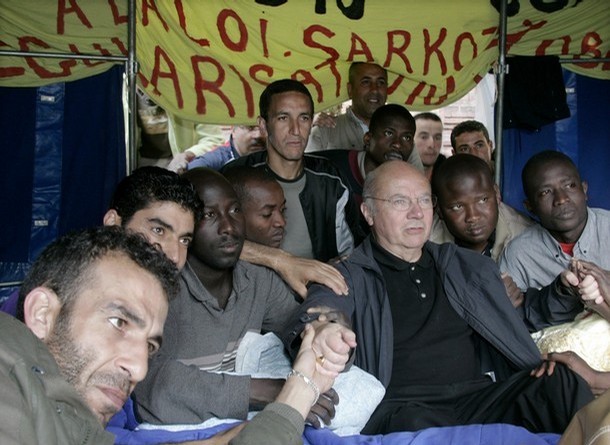Bishop Gaillot
The last time Bishop Gaillot was feted in the United States was at the 1996 Call to Action Conference in Detroit. The title of his address was, “My Option for the Poor.” You can read it here.
After that, I haven’t heard about him. He is a man who deserves never to be forgotten, although that is what Pope John Paul II hoped, when Gaillot was removed from the Diocese of Evreux, France and appointed to an ancient and fictitious see, Partenia.
The See of Partenia, now located in the desert of Algeria, has not existed in reality since the 5th century when it was in Mauritania. But, thanks to the web, Gaillot managed to outwit the Vatican and continues to teach and pastor via the internet as a “virtual bishop.”
“As Partenia does not exist anymore” says Gaillot, “it becomes the symbol of all who feel like non-existing in society or in the Church. It is a huge diocese without borders where the sun never sets.” Travel to Partenia here.
Bishop Gaillot didn’t start off as a radical. Little by little, his contacts with people who came to see him and events to which he chose to respond led him to some unexpected places:
He called on all Catholics to persist in dialog without condemnation so that the church can, as Jesus did, embrace the dispossessed: those marginalized by poverty; those living with AIDS, those in prison, those ostracized for homosexuality; and ultimately, those struggling on the borderlands of their own Christian faith. 
“If we take as our starting point the poor, everything will be renewed – liturgy, catechism, the life of the church. It changes the way we think, pray, our very lifestyle. But if we take as our starting point the Status Quo, we will never be able to catch up with the Good News.”
Gaillot infuriated members of the French Bishops’ Conference and the Vatican with his outspokenness on a number of issues including clerical celibacy, the use of condoms for the prevention of AIDS, ordination of women and married men to the priesthood, and especially, homosexuality.
“The church must be where there is need, and homosexuals have suffered innumerable discriminations. If the church doesn’t free people from oppression, what purpose does it serve?” he asked.
In 1988 Gaillot took the unprecedented step for a Roman Catholic bishop of blessing a homosexual union after the couple requested it in view of their imminent death from AIDS.
He was the only French bishop to participate in the ceremony of the transfer of the ashes of the Abbe Henri-Baptiste Gregoire to the Pantheon, a burial place for “the great men of France.”
Gregoire (1750-1831), a Catholic priest and bishop, was a leading French abolitionist at the turn of the 18th century, a participant in the Revolution of 1789, and a member of its governing assembly.
Gregoire was among the most active deputies of the Assembly, advocated abolishing Negro slavery and granting citizenship to Jews. He objected to some provisions of the Civil Constitution of the Clergy, but agreed to swear the oath of allegiance and was the first member of the clergy to take it (1790). Because of this, the hierarchy of the church refused to give him the last sacraments. (Although he was given them by some sympathetic priests in defiance of the ban.)
After these and other “incidents,” Pope John Paul II relieved Bishop Gaillot of his responsibilities as bishop of Evreux on January 13, 1995. After being removed from his office Bishop Gaillot wrote the following statement:
“I had a dream: to be able to accompany the poor, the excluded, the ignored, without having to explain myself or justify myself to the rich, the secure, or the comfortable. To be able to go where distress calls me without having to give advance notice. To be able to show my indignation at destitution, injustice, violence, the sale of weapons, and managed famines without being considered a meddler in politics.”
“I dreamed of being able to live my faith within the church, but also in society, in my time and with my times. I dreamed of the freedom to think and express myself, to debate and criticise, without fear of the guillotine. I dreamed of the being different within the unity of faith, and remaining myself, alone and yet in solidarity with others. Ultimately, I hoped to be able to proclaim a Gospel of freedom without being marginalised.”
